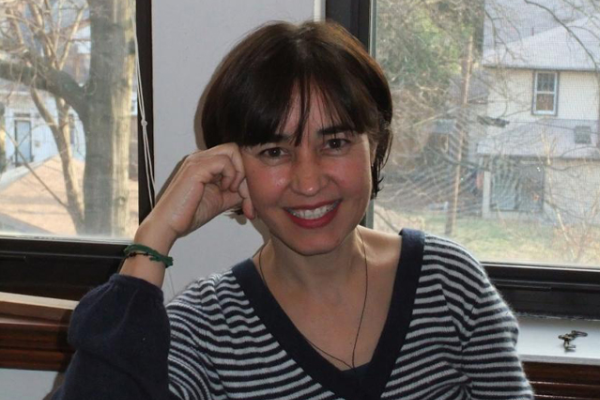On Feb. 19, Sr. Dianna Ortiz, OSU died of recently diagnosed cancer at age 62. Ortiz is known for her international anti-torture activism following her own kidnapping and torture in Guatemala in 1989.
Rose Marie Berger, Sojourners senior editor, knew Ortiz through her advocacy work and through the Assisi Community in Washington, D.C., where Ortiz lived for 25 years. Berger described Ortiz as a petite, quiet, and attentive person “with a very young face.” But Berger said Ortiz was best defined by her “incredible” strength.
“I keep thinking that Dianna is what resurrection looks like in public,” said Berger. “She came out of the belly of death in Guatemala with her scars intact, and she dealt with her wounds every single day. Somehow, she turned her experiences of death into something that saved the lives of thousands of people."
Born in 1958, Ortiz was the middle of eight children raised in Grants, N.M. At 6 years old, Ortiz announced she wanted to become a nun. In her late teens, she moved to Maple Mount, Ky., to join the Ursuline Sisters of Mount St. Joseph.
For a decade, Ortiz taught kindergarten in Kentucky before beginning her life as a missionary. In September 1987, she arrived in a remote Mayan village in the Guatemalan highlands where she taught reading, art, and Bible stories to the children.
"On Saturday, children of all ages would come in droves," Ursuline Sister Luisa Bickett told Agni, a literary magazine housed at Boston University, in 1998. "The kids were always around. She was very happy. We teased Dianna that Guatemala was her first love."
But amid her happiness, Ortiz received threatening letters and messages from strangers. Fearful, Ortiz briefly returned to Kentucky before going back to Guatemala.
In November 1989, Ortiz was kidnapped from the Guatemalan convent by police officers who took her to a secret prison at a police academy in Guatemala City. She was then tortured and raped.
Ortiz escaped, and, after returning to the United States, she publicized the fact that the man in charge of her torturers was an American.
“As a U.S. citizen, I had another advantage: I could, in relative safety, reveal afterwards the details of what happened to me in those twenty-four hours,” Ortiz told the International Socialist Review in 1999. “One of those details: an American was in charge of my torturers.” In her 2002 memoir, The Blindfold’s Eyes: My Journey from Torture to Truth, Ortiz tentatively identified her American torturer as a CIA operative, but she was never able to confirm his identity.
Ortiz pursued her case legally both in Guatemala and the U.S. She was the first to seek civil damages under the 1992 Torture Victim Protection Act, suing the former Guatemalan minister of defense, General Héctor Gramajo, who was in power at the time of her abduction; Ortiz was awarded $5 million in damages. She also filed a case with the Inter-American Commission of Human Rights.
Ortiz spent her life advocating for torture victims around the world, as well as petitioning the U.S. government to release details about the events leading to her own kidnapping and torture. Her activism included a public fast and demonstration in front of the White House, civil disobedience, and interviews that helped reveal widespread corruption in the Guatemalan media.
According to Robert F. Kennedy Human Rights, a nonprofit human rights advocacy organization, “Ortiz’s raw honesty and capacity to articulate the agony she suffered compelled the United States to declassify long-secret files on Guatemala, and shed light on some of the darkest moments of Guatemalan history and American foreign policy.”
In 1998, Ortiz founded the Torture Abolition and Survivors Support Coalition International (TASSC) and served as its first executive director for the following 10 years. The only organization in the U.S. founded by and for survivors of torture, TASSC provides support particularly to survivors living in the U.S. The organization has championed issues such as the treatment of detainees at the U.S. base of Guantanamo and repealing the Military Commissions Act of 2006, which “gives the president absolute power to decide who is an enemy of our country and to imprison people indefinitely without charging them with a crime,” according to the ACLU.
“We have a moral responsibility to speak out,” said Ortiz in an undated interview on TASSC's website, “and to create a world where the next generation will be spared… where the dignity of all people is respected and where the human rights of all people are protected. We cannot ever lose sight of the reality that we are our sisters and brothers keepers."
Ortiz's story was shared via two plays, paired together in Ana Castillo’s Psst ... I Have Something to Tell You, Mi Amor (Wings Press).
From 2009 to 2012, Ortiz continued her advocacy at Pax Christi USA, a Catholic organization dedicated to peace, serving as program director and internship program coordinator with the organization. Then, from 2019 to 2021, she was Pax Christi USA’s deputy director.
“Part of the healing for survivors is being able to reclaim one’s voice,” Ortiz said in an undated interview with the Ursuline Sisters of Mount Saint Joseph. “I often say, and I think all of the other survivors will agree, that one never heals from torture. We learn to live with our experience. We try daily not to allow it to define who we are or what path we will walk … and it’s no easy task.”
Ortiz won numerous awards for her work, including the Pax Christi USA Teacher of Peace award, the Center for Victims of Torture Eclipse Award, the U.S. Catholic Award for furthering the cause of women in the Catholic Church, and the Oscar Romero Award of the Rothko Chapel in Houston, Texas.
Yet, Ortiz’s ministry was the result of lifelong struggle. As Johnny Zokovitch, executive director of Pax Christi USA, tweeted: “The joy she shared with so many was hard fought for her; she was a torture survivor and the strength, grace, courage and dignity she evidenced in her pursuit of the truth of what happened to her...and then her commitment to helping other survivors was deeply inspiring.”
Editor's note: This article was updated on Feb. 22, 2021 at 4:45 p.m. to correct the year Ortiz was born.
Got something to say about what you're reading? We value your feedback!







